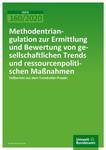Method triangulation for the identification and evaluation of societal trends and resource policy measures
Abstract
Using natural resources sustainably in the long term requires not only the application and dissemination of resource-conserving technologies and infrastructures, but also changes in individual and collective behaviour and social practices. Emerging and expected future developments and changes - e.g. in the sense of trends and megatrends - not only have a major influence on which innovations develop and how and unfold social relevance, but also on the extent of our future resource use. Therefore, a future-oriented resource policy must anticipate trends and their potential effects in order to be able to design and implement appropriate policy measures. In doing so, the social connectivity and relevance of the measures must be taken into account. Against this background, different methods were combined in the project "Trend Radar Resource Policy" in order to identify and evaluate trends and resource policy measures. By means of trend analysis, 20 socially relevant trends were first identified and qualitatively described. These trends were then empirically mirrored in the context of a three-week Moderated Research Online Community (MROC) on the perceptions, attitudes and interpretation patterns in the population that are relevant for resource policy. At the same time, policy measures were identified and qualitatively assessed with regard to relevance and possible obstacles to implementation. In a forthcoming empirical phase, the social connectivity and acceptance of the policy measures will be investigated.
